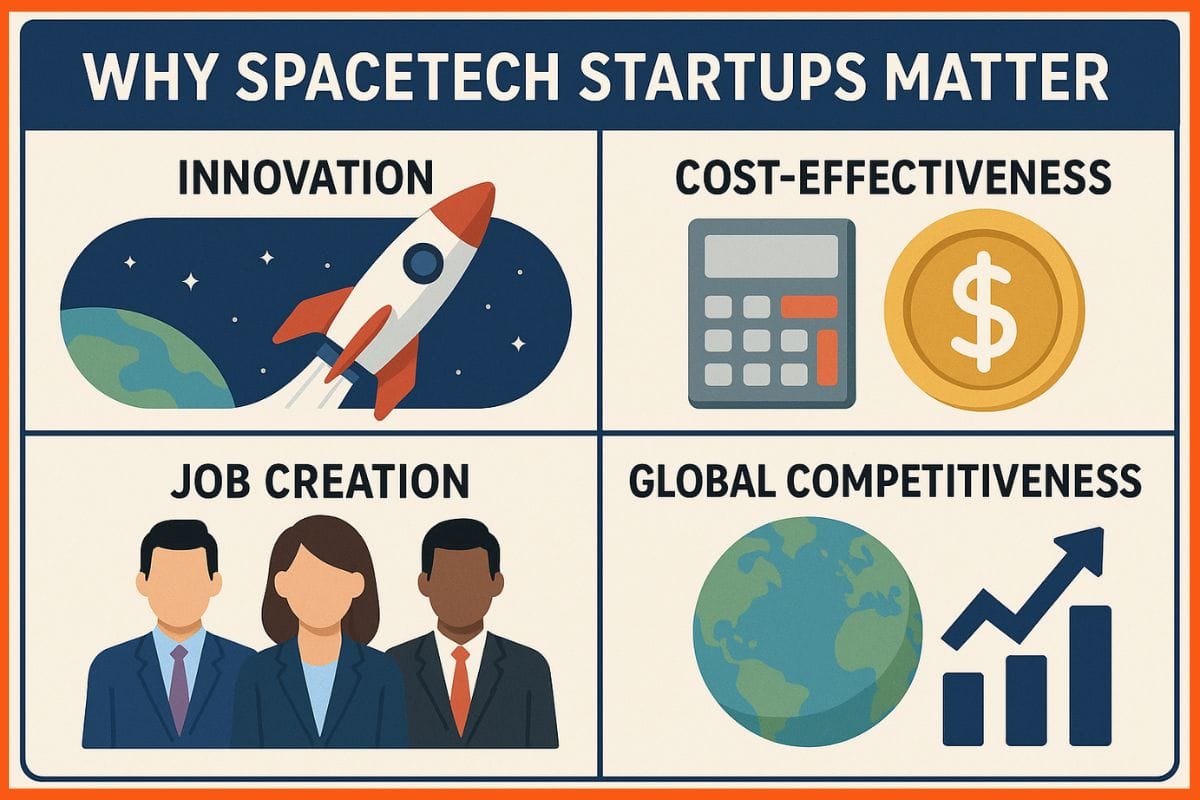India, a nation renowned for its rich history and culture, has advanced significantly in the area of space technology. While the Indian Space Research Organization (ISRO) has led the way in these developments, several creative startups are also starting to make their name in this fascinating field. This blog will examine some of the leading spacetech companies in India, their accomplishments, and the ways in which they are transforming space exploration and technology.
Why Spacetech Startups Matter
Top Spacetech Startups in India
The Impact of These Startups
Challenges Faced by Spacetech Startups
Future Prospects
Why Spacetech Startups Matter

Spacetech startups are crucial for several reasons:
- Innovation: They bring fresh ideas and new technologies to the table.
- Cost-Effectiveness: Startups often find more affordable ways to achieve complex goals.
- Job Creation: They create employment opportunities in high-tech fields.
- Global Competitiveness: These startups help India compete on a global scale.
Now, let’s delve into some of the top spacetech startups in India that are making waves in the industry.
Top Spacetech Startups in India
| Startup | Founded | Location | Founders | Mission | Key Focus/Highlight |
|---|---|---|---|---|---|
| Pixxel | 2019 | Bengaluru | Awais Ahmed, Kshitij Khandelwal | To democratize access to satellite imagery data | Fireflies Constellation for environmental monitoring |
| Bellatrix Aerospace | 2015 | Bengaluru | Rohan Ganapathy, Yashas Karanam | Develops and manufactures advanced technologies for in-space mobility | Proprietary Electric Propulsion System for efficient space missions |
| Skyroot Aerospace | 2018 | Hyderabad | Pawan Kumar Chandana, Naga Bharath Daka | To make spaceflight as simple, affordable, and reliable as airflight | Vikram Series – launch vehicles for small satellite deployment |
| Agnikul Cosmos | 2017 | Chennai | Srinath Ravichandran, Moin SPM | Demonstrate in-house tech and enable efficient launches with Agnikul’s Agnibaan rocket | On-demand, customizable launch vehicles for small payloads (up to 100 kg to LEO) |
| Vesta Space Technology | 2018 | Pune | Arun Kumar Sureban | Provider of satellite-based communication services | End-to-end satellite solutions: design, development, and launch |
Pixxel
| Founded | 2019 |
|---|---|
| Founders | Awais Ahmed and Kshitij Khandelwal |
| Mission | To democratize access to satellite imagery data |
Pixxel is a Bengaluru-based startup that is making headlines with its ambitious plans to build a constellation of Earth-imaging satellites. These satellites are designed to capture high-resolution images of the Earth, providing valuable data for various applications such as agriculture, urban planning, and disaster management.

Bellatrix Aerospace
| Founded | 2015 |
|---|---|
| Founders | Rohan Ganapathy and Yashas Karanam |
| Mission | develops and manufactures advanced technologies for in-space mobility |
Bellatrix Aerospace is another Bengaluru-based startup that focuses on developing advanced propulsion systems for satellites. Their proprietary Electric Propulsion System aims to make space missions more efficient and cost-effective.
Skyroot Aerospace
| Founded | 2018 |
|---|---|
| Founders | Pawan Kumar Chandana and Naga Bharath Daka |
| Mission | To make spaceflight as simple, affordable, and reliable as airflight |
Skyroot Aerospace, based in Hyderabad, is working on developing launch vehicles that can successfully take satellites into space. Their flagship product, Vikram Series, is designed to cater to the needs of small satellite launches.
Agnikul Cosmos
| Founded | 2017 |
|---|---|
| Founders | Srinath Ravichandran and Moin SPM |
| Mission | To demonstrate the in-house and home-grown technologies, gather flight data, and ensure optimal functioning of Agnikul’s orbital launch vehicle, Agnibaan |
Agnikul Cosmos is a Chennai-based startup that is developing a customizable and on-demand launch vehicle. Their Agnibaan rocket is designed to carry payloads of up to 100 kg to low Earth orbit, making it ideal for small satellite missions.
Vesta Space Technology
| Founded | 2018 |
|---|---|
| Founders | Arun Kumar Sureban |
| Mission | Provider of satellite-based communication services |
Vesta Space Technology is a Pune-based startup that specializes in small-satellite technology. They provide end-to-end solutions for satellite missions, including design, development, and launch services.
The Impact of These Startups
These startups are not just contributing to India’s spacetech landscape; they are also making a global impact. Here are some ways they are influencing the world:
- Advancing Technology: By developing new technologies, these startups are pushing the boundaries of what is possible in space exploration.
- Reducing Costs: Their cost-effective solutions are making space missions more affordable, which could lead to more frequent and varied space activities.
- Data Accessibility: Companies like Pixxel are democratizing access to satellite data, which can be used for a wide range of applications from environmental monitoring to urban planning.
- Inspiring Innovation: Their success stories inspire other entrepreneurs and innovators to venture into the spacetech field.
Challenges Faced by Spacetech Startups
While these startups are making significant progress, they also face several challenges:
- Funding: Securing adequate funding is often a major hurdle.
- Regulatory Hurdles: Navigating the complex regulatory landscape can be daunting.
- Technical Challenges: Developing cutting-edge technology is inherently risky and challenging.
- Market Competition: The global spacetech market is highly competitive, with established players like SpaceX and Blue Origin.
Future Prospects
The future looks promising for India’s spacetech startups. With increasing support from the government and private investors, these startups are well-positioned to achieve their ambitious goals. The Indian government’s recent reforms in space policy, aimed at encouraging private sector participation, are also likely to provide a significant boost to these startups.
Conclusion
India’s spacetech startups are significantly influencing how technology and space exploration develop in the future. These startups are at the forefront of innovation, creating customizable launch vehicles, sophisticated propulsion systems, and Earth-imaging satellites. Despite a number of obstacles, they have the potential to have a huge impact on the world at large as well as India.
You can get a sneak peek at the direction space technology is taking as an explorer by keeping a watch on these startups. Who knows? The next big breakthrough in spacetech could very well come from one of these innovative Indian startups.

FAQs
What are spacetech startups?
Spacetech startups are companies that develop innovative technologies for space exploration, satellite services, and related infrastructure.
Which are the top spacetech startups in India?
Some of the leading spacetech startups in India include Pixxel, Bellatrix Aerospace, Skyroot Aerospace, Agnikul Cosmos, and Vesta Space Technology.
What challenges do Indian spacetech startups face?
Common challenges include limited funding, regulatory complexities, high technical risks, and competition from global giants.













